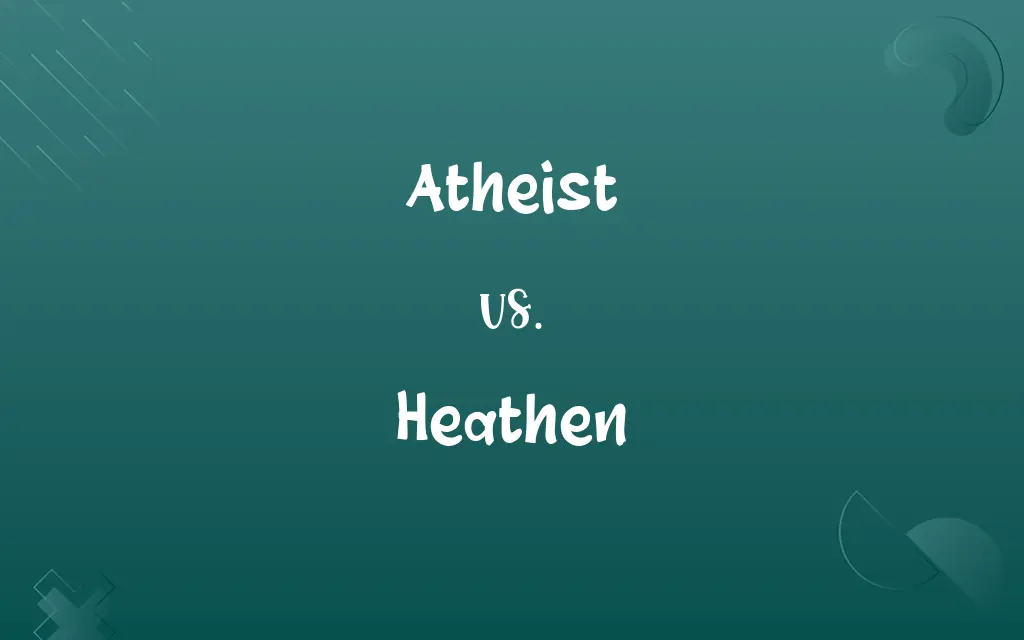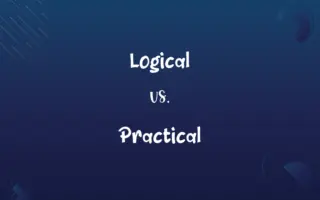Atheist vs. Heathen: Know the Difference

By Hifza Nasir & Shumaila Saeed || Updated on March 4, 2024
Atheist denies the existence of deities, focusing on a lack of belief, while heathen often implies adherence to a non-mainstream or pagan belief system.

Key Differences
An atheist is someone who does not believe in the existence of any gods or deities. This stance is strictly non-theistic, where the absence of belief in gods is central. On the other hand, the term "heathen" historically refers to a person who practices a pre-Christian or non-Christian religion, often with a connotation of being uncivilized or irreligious from a monotheistic perspective.
Shumaila Saeed
Mar 04, 2024
While atheism is rooted in skepticism or rejection of religious claims about deities, heathenism may involve the worship of multiple gods or nature spirits, indicating a structured belief system. Whereas atheists reject religious frameworks altogether, heathens might follow rituals and mythologies associated with their beliefs.
Hifza Nasir
Mar 04, 2024
Atheists often engage in discussions and movements focusing on secularism and rationalism, advocating for a separation of church and state. In contrast, heathens may not necessarily oppose religious institutions but rather adhere to alternative spiritual practices outside the dominant monotheistic traditions.
Hifza Nasir
Mar 04, 2024
The atheist identity is typically chosen based on personal conviction and reasoning regarding the nonexistence of deities. Conversely, identifying as a heathen can also be a cultural or heritage choice, reflecting ancestral or traditional pagan practices.
Dua Fatima
Mar 04, 2024
Atheism is a broad category that includes individuals with various philosophical viewpoints, as long as they share a disbelief in gods. Heathenry, however, is more specific, often associated with ancient European polytheistic traditions, such as Norse or Germanic paganism.
Shumaila Saeed
Mar 04, 2024
ADVERTISEMENT
Comparison Chart
Definition
Disbelief in any gods or deities.
Adherence to non-mainstream or pagan beliefs.
Shumaila Saeed
Mar 04, 2024
Religious Framework
Rejects religious claims and institutions.
May follow specific rituals and mythologies.
Hifza Nasir
Mar 04, 2024
Philosophical Stance
Often rooted in rationalism and secularism.
Cultural or heritage choice.
Hifza Nasir
Mar 04, 2024
Associated Traditions
None specifically; varies individually.
Often linked to ancient European paganism.
Shumaila Saeed
Mar 04, 2024
ADVERTISEMENT
Atheist and Heathen Definitions
Atheist
A non-believer in god(s) or deities.
Atheist authors frequently explore themes of existentialism in their works.
Hifza Nasir
Mar 04, 2024
Heathen
A person often associated with ancient European paganism.
Heathen communities sometimes gather for traditional ceremonies.
Shumaila Saeed
Mar 04, 2024
Atheist
One who lacks faith in deities and supernatural claims.
She identifies as an atheist and values scientific explanations over religious ones.
Shumaila Saeed
Mar 04, 2024
Heathen
A follower of a pre-Christian or non-Christian religion.
The heathen rituals were rooted in ancient Norse traditions.
Shumaila Saeed
Mar 04, 2024
Atheist
An individual without a theistic belief system.
As an atheist, he does not participate in religious rituals.
Hifza Nasir
Mar 04, 2024
ADVERTISEMENT
Heathen
A practitioner of a belief system outside of the dominant monotheistic religions.
Heathen symbols often incorporate elements of nature and mythology.
Dua Fatima
Mar 04, 2024
Atheist
A person who does not believe in the existence of any gods.
An atheist might advocate for the removal of religious symbols in public spaces.
Hifza Nasir
Mar 04, 2024
Heathen
Someone adhering to non-mainstream religious beliefs.
As a heathen, he honors the deities of his ancestors.
Dua Fatima
Mar 04, 2024
Atheist
Someone who rejects the notion of divine beings.
The atheist community often discusses secularism and ethics.
Shumaila Saeed
Mar 04, 2024
Heathen
An individual practicing paganism or polytheism.
She identifies as a heathen, celebrating the solstices and equinoxes.
Hifza Nasir
Mar 04, 2024
Heathen
An adherent of a religion that does not worship the God of Judaism, Christianity, or Islam.
Hifza Nasir
Oct 19, 2023
Atheist
One who disbelieves or denies the existence of a God, or supreme intelligent Being.
Hifza Nasir
Oct 19, 2023
Heathen
Heathen An adherent of a Neopagan religion that seeks to revive the religious beliefs and practices of the ancient Germanic peoples.
Hifza Nasir
Oct 19, 2023
Repeatedly Asked Queries
What does it mean to be a heathen?
Being a heathen typically means adhering to a non-mainstream or ancient pagan belief system.
Hifza Nasir
Mar 04, 2024
Can atheists be spiritual?
Yes, atheists can experience spirituality without believing in deities, often finding wonder in nature, human relationships, or the universe.
Hifza Nasir
Mar 04, 2024
What rituals do heathens practice?
Heathen rituals can include offerings, seasonal celebrations, and honoring ancestors, varying by tradition.
Dua Fatima
Mar 04, 2024
Is atheism a religion?
No, atheism is not a religion; it's a lack of belief in gods or deities.
Hifza Nasir
Mar 04, 2024
Are all heathens pagans?
While all heathens can be considered pagans due to their polytheistic or nature-based beliefs, not all pagans identify as heathens, as paganism encompasses a wider range of beliefs.
Shumaila Saeed
Mar 04, 2024
Do heathens believe in gods?
Yes, many heathens believe in multiple gods or nature spirits, depending on their specific tradition.
Hifza Nasir
Mar 04, 2024
How do atheists explain the universe?
Atheists may turn to scientific explanations for the universe's origins, such as the Big Bang theory and evolution.
Shumaila Saeed
Mar 04, 2024
What is the historical context of the term "heathen"?
Historically, "heathen" was used by Christian societies to describe those who practiced pre-Christian or non-Christian religions, often with a derogatory connotation.
Hifza Nasir
Mar 04, 2024
Can someone be both an atheist and a heathen?
Typically no, because atheism involves disbelief in all deities, while heathenism involves belief in some form of divinity.
Hifza Nasir
Mar 04, 2024
What is the difference between atheism and agnosticism?
Atheism is the disbelief in deities, while agnosticism is the view that the existence of deities is unknown or unknowable.
Hifza Nasir
Mar 04, 2024
How do atheists view morality?
Atheists may base their morality on humanism, reason, and ethical principles rather than religious doctrines.
Hifza Nasir
Mar 04, 2024
What is the significance of nature in heathen beliefs?
Nature often plays a central role in heathen beliefs, with many traditions emphasizing the reverence for the natural world and its cycles.
Dua Fatima
Mar 04, 2024
Why do people choose atheism?
Individuals may choose atheism for reasons including skepticism of religious claims, appreciation for scientific explanations, or personal philosophical beliefs.
Shumaila Saeed
Mar 04, 2024
Can heathens be part of organized religions?
Yes, some heathen traditions have organized groups or communities that share beliefs and practices.
Hifza Nasir
Mar 04, 2024
Share this page
Link for your blog / website
HTML
Link to share via messenger
About Author
Written by
Hifza NasirCo-written by
Shumaila SaeedShumaila Saeed, an expert content creator with 6 years of experience, specializes in distilling complex topics into easily digestible comparisons, shining a light on the nuances that both inform and educate readers with clarity and accuracy.









































































